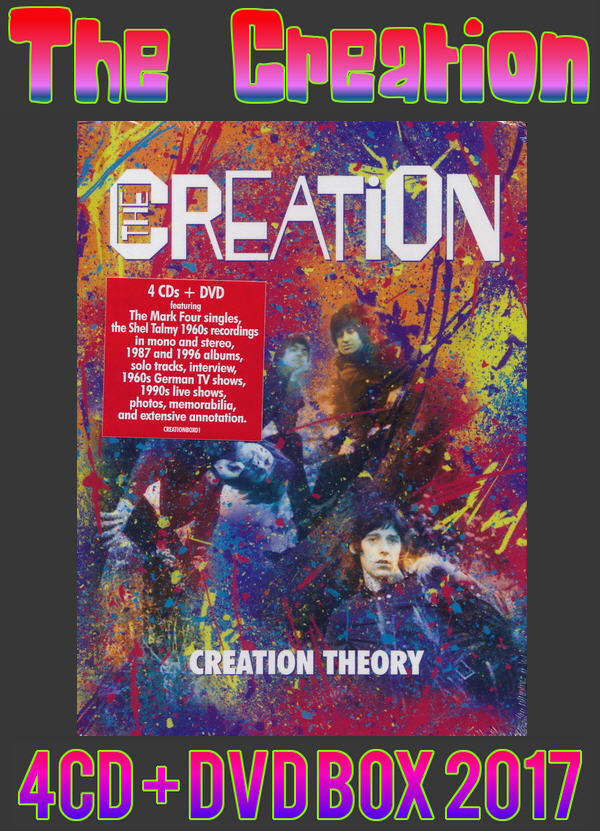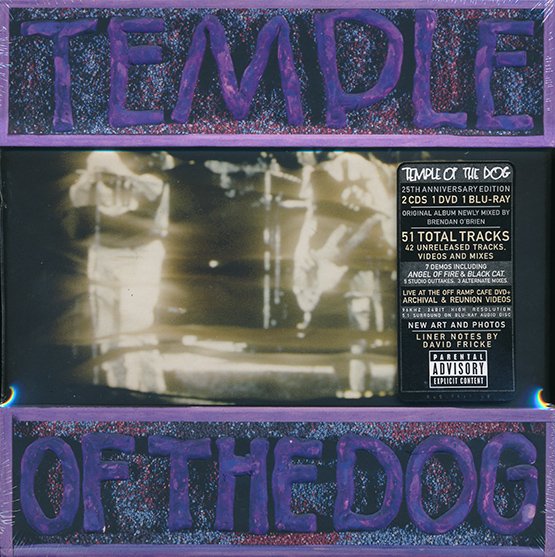The Creation: 2017 Creation Theory - 4CD + DVD Box Set Edsel Records
Lossless Galaxy Release The Creation: 2017 Creation Theory 4CD + DVD Box Set Edsel Records Performer: The Creation Box: 2017 Creation Theory (4CD + DVD Box Set Edsel Records) Info: Demon Music / Edsel Records Bam-Caruso Records / Cherry Red Records / Universal Music CD / DVD / Amazon Exclusive Limited Edition Numbered (limited to 500) № 127 Catalog Box / All Discs: CREATIONBOX01 Made in EU Dynamic Range: 8 / 8 / 9 / 10 Genre / Style: Rock / Mod Released Year: Apr 28, 2017 Format: CDs: FLAC /

The Creation: 2017 Creation Theory - 4CD + DVD Box Set Edsel Records
Lossless Galaxy Release The Creation: 2017 Creation Theory 4CD + DVD Box Set Edsel Records Performer: The Creation Box: 2017 Creation Theory (4CD + DVD Box Set Edsel Records) Info: Demon Music / Edsel Records Bam-Caruso Records / Cherry Red Records / Universal Music CD / DVD / Amazon Exclusive Limited Edition Numbered (limited to 500) № 127 Catalog Box / All Discs: CREATIONBOX01 Made in EU Dynamic Range: 8 / 8 / 9 / 10 Genre / Style: Rock / Mod Released Year: Apr 28, 2017 Format: CDs: FLAC /
13 10, 2025
Temple Of The Dog: 1991 Temple Of The Dog - 2CD + LP + DVD + Blu-ray Audio Super Deluxe Box Set A&M Records 2016
Lossless Galaxy Release Temple Of The Dog: 1991 Temple Of The Dog 2CD + LP + DVD + Blu-ray Super Deluxe Box Set A"> Performer: Temple Of The Dog Box / Album: 1991Temple Of The Dog (2CD + LP + DVD + Blu-ray Super Deluxe Box Set A"> Каждый альбом можно скачать отдельно Each album can be downloaded separately • • • • • • • • • • • • • • • • • • • • • • • • • • • • • • • • Upload: xFile.cloud (5% recovery)

Temple Of The Dog: 1991 Temple Of The Dog - 2CD + LP + DVD + Blu-ray Audio Super Deluxe Box Set A&M Records 2016
Lossless Galaxy Release Temple Of The Dog: 1991 Temple Of The Dog 2CD + LP + DVD + Blu-ray Super Deluxe Box Set A"> Performer: Temple Of The Dog Box / Album: 1991Temple Of The Dog (2CD + LP + DVD + Blu-ray Super Deluxe Box Set A"> Каждый альбом можно скачать отдельно Each album can be downloaded separately • • • • • • • • • • • • • • • • • • • • • • • • • • • • • • • • Upload: xFile.cloud (5% recovery)
13 10, 2025
SUPREME JAZZ «Series- SACD Collection» (16 × SACD • Membran Music Ltd. • 2006)
Collection: "SUPREME JAZZ" Artist: SONNY ROLLINS, DUKE ELLINGTON, BARNEY KESSEL, GERRY MULLIGAN, LESTER YOUNG, STAN GETZ, DIZZY GILLESPIE, DAVE BRUBECK, CHARLES MINGUS, CLARK TERRY, CANNONBALL ADDERLEY, OSCAR PETERSON, JOHN COLTRANE, SONNY CLARK TRIO, GROVER WASHINGTON, Jr. Series: SACD-Mastering Hommage Multimedia GmbH— Label: (c)(p) 2006 Membran International GmbH / Audio Fidelity / Sony Music Source: Rip by PS³SACD ⇒ Conversion DSD64 by KoGGaN™ scans by inet… Official DR value:

SUPREME JAZZ «Series- SACD Collection» (16 × SACD • Membran Music Ltd. • 2006)
Collection: "SUPREME JAZZ" Artist: SONNY ROLLINS, DUKE ELLINGTON, BARNEY KESSEL, GERRY MULLIGAN, LESTER YOUNG, STAN GETZ, DIZZY GILLESPIE, DAVE BRUBECK, CHARLES MINGUS, CLARK TERRY, CANNONBALL ADDERLEY, OSCAR PETERSON, JOHN COLTRANE, SONNY CLARK TRIO, GROVER WASHINGTON, Jr. Series: SACD-Mastering Hommage Multimedia GmbH— Label: (c)(p) 2006 Membran International GmbH / Audio Fidelity / Sony Music Source: Rip by PS³SACD ⇒ Conversion DSD64 by KoGGaN™ scans by inet… Official DR value:
13 10, 2025
Жанры
Lossless Galaxy Release
Русская музыка
--Поп
--Рок
--Панк
--Альтернатива
--Металл
--Рэп, Хип-Хоп, R'n'B
--Джаз и Блюз
--Фолк
--Шансон, Авторская песня
--СССР
Зарубежная музыка
--Pop
--Rock
--Hard Rock
--Progressive & Art-Rock
--Pop-Rock & Soft Rock
--Instrumental Rock
--Heavy, Traditional, Industrial Metal
--Power, Gothic, Sympho Metal
--Thrash, Speed, Groove, Modern Metal
--Death, Melodic Death, Doom, Dark Metal
--Black, Pagan, Folk, Viking Metal
--Alternative
--Punk
--Disco, Eurodance
--Rap, Hip Hop, R'n'B
--Reggae, Ska, Dub
--Jazz, Blues, Soul
--Folk, Country, Ethnic
--Electronic, Ambient, New Wave
--House, Techno, Trance
Другие жанры
--New Age, Relax, Meditative & Flamenco
--Chillout, Lounge, Downtempo, Trip-Hop
--Drum & Bass, Jungle, Breakbeat, IDM
--Classical / Классическая музыка
--Soundtrack
--Музыкальные сказки
Vinyl Rip
HI-Res / DVD-Audio / DTS
--SACD
--DSD
--DVD-Audio
Сборники Lossless-Galaxy
Альбомы 2022
Альбомы 2023
Альбомы 2024
Теги
1st Press 2022 2023 2024 2025 70... AOR Black Metal Blues Blues Rock Bootleg Series Classic Rock Death Metal Discography Exclusive for Lossless-Galaxy Folk Rock Fusion Hard Rock Heavy Metal Hi-Res Japanese Edition Jazz Jazz Rock lossless Melodic Death Metal Melodic Rock Modern Electric Blues Pop Pop Rock Power Metal Prog Rock Progressive Metal Progressive Rock Psych Rock Psychedelic Rock Rock SACD Symphonic Metal Thrash Metal Дискографии от KoGGaN
Архивы
Опрос
В каком формате хотели бы видеть релизы на сайте ?
 Автор: sirk, 5 июля 2021, Комментариев: 0, Просмотров: 652
Автор: sirk, 5 июля 2021, Комментариев: 0, Просмотров: 652Mick Softley - Sunrise / Street Singer (1970-71) (2005) 2CD
Artist: Mick Softley
Title Of Album: Sunrise / Street Singer
Year Of Release: 1970-71/2005
Label (Catalog#) : BGO [BGOCD 660]
Country: Uk
Genre: Folk Rock, Bluesy
Quality: FLAC (*tracks + .cue,log,covers)
Bitrate: Lossless
Total Time: 47:00+44:21
Total Size: 509Mb(+3%)
Title Of Album: Sunrise / Street Singer
Year Of Release: 1970-71/2005
Label (Catalog#) : BGO [BGOCD 660]
Country: Uk
Genre: Folk Rock, Bluesy
Quality: FLAC (*tracks + .cue,log,covers)
Bitrate: Lossless
Total Time: 47:00+44:21
Total Size: 509Mb(+3%)
Tracks:
-------
Disc 1 Sunrise 1970
1. Can You Hear Me Now? - 2:46
2. Waterfall - 2:09
3. Eagle - 4:25
4. Julia Argoyne - 2:30
5. Caravan - 3:03
6. If You're Not Part Of The Solution, You Must Be Part Of The Problem - 2:50
7. Ship - 6:07
8. You Go Your Way, I'll Go Mine - 3:56
9. Birdie, Birdie - 4:05
10.Time Machine - 4:57
11.On The Road Again - 1:43
12.Love Colours - 8:23
Disc 2 Street Singer 1971
1. Goin' Down The Road - 4:25
2. Ragtime Mama - 4:11
3. Water Sister, Water Brother - 3:46
4. Just Flew In On A Jet Plane - 2:36
5. Shucks Blues - 2:01
6. I Seen Good Times, I Seen Bad - 4:15
7. Peoples Talkin' About Hard Times - 2:56
8. Hope - 2:28
9. Hey Mama - 2:03
10.Gypsy - 3:17
11.Goldwatch Blues - 2:54
12.Went Down To The Sea - 2:28
13.New Day, New Way - 6:56
Personnel:
-----
Mick Softley - Acoustic Guitar, Harmonium
Tony Cox - Harmonium, Piano, String Conductor, Synthesizer
Jerry Donahue - Electric Guitar
Gerry Conway - Drums, Percussion
Lyn Dobson - Flute, Harmonica, Soprano, Tenor Saxophones, Sitar
Chris Laurence, Pat Donaldson - Bass
Barry Clarke - Acoustic, Electric, Guitars
Ned Balen - Tabla
Mike Vickers - Synthesizer
Lesley Duncan, Sue Wheatman, Sunny Wheetman - Vocals
Tony Carr - Percussion
Gringo - Vocals
Steve Hayton - Acoustic Guitar, Harmonica
David Horowitz - Piano
Karl Jenkins - Baritone Sax
Montpelier Strings - Strings
Dudu Pukwana - Alto Sax
Frank Ricotti - Marimba, Percussion
Richard Thompson - Electric Guitar
Doris Troy, Smiley Brothers, Liza Strike, Jimmy Thomas - Vocals
All thanks to original releaser
-------
Disc 1 Sunrise 1970
1. Can You Hear Me Now? - 2:46
2. Waterfall - 2:09
3. Eagle - 4:25
4. Julia Argoyne - 2:30
5. Caravan - 3:03
6. If You're Not Part Of The Solution, You Must Be Part Of The Problem - 2:50
7. Ship - 6:07
8. You Go Your Way, I'll Go Mine - 3:56
9. Birdie, Birdie - 4:05
10.Time Machine - 4:57
11.On The Road Again - 1:43
12.Love Colours - 8:23
Disc 2 Street Singer 1971
1. Goin' Down The Road - 4:25
2. Ragtime Mama - 4:11
3. Water Sister, Water Brother - 3:46
4. Just Flew In On A Jet Plane - 2:36
5. Shucks Blues - 2:01
6. I Seen Good Times, I Seen Bad - 4:15
7. Peoples Talkin' About Hard Times - 2:56
8. Hope - 2:28
9. Hey Mama - 2:03
10.Gypsy - 3:17
11.Goldwatch Blues - 2:54
12.Went Down To The Sea - 2:28
13.New Day, New Way - 6:56
Personnel:
-----
Mick Softley - Acoustic Guitar, Harmonium
Tony Cox - Harmonium, Piano, String Conductor, Synthesizer
Jerry Donahue - Electric Guitar
Gerry Conway - Drums, Percussion
Lyn Dobson - Flute, Harmonica, Soprano, Tenor Saxophones, Sitar
Chris Laurence, Pat Donaldson - Bass
Barry Clarke - Acoustic, Electric, Guitars
Ned Balen - Tabla
Mike Vickers - Synthesizer
Lesley Duncan, Sue Wheatman, Sunny Wheetman - Vocals
Tony Carr - Percussion
Gringo - Vocals
Steve Hayton - Acoustic Guitar, Harmonica
David Horowitz - Piano
Karl Jenkins - Baritone Sax
Montpelier Strings - Strings
Dudu Pukwana - Alto Sax
Frank Ricotti - Marimba, Percussion
Richard Thompson - Electric Guitar
Doris Troy, Smiley Brothers, Liza Strike, Jimmy Thomas - Vocals
All thanks to original releaser
Внимание! У Вас нет прав для просмотра скрытого текста.
Изменил: sirk по причине: RE-UP
Похожие новости:
Комментарии отсутствуют
Добавить комментарий!
Информация
Посетители, находящиеся в группе Гости, не могут оставлять комментарии к данной публикации.


![Mick Softley - Any Mother Doesn't Grumble (1972) [2016]](/uploads/posts/2024-01/thumbs/ms.jpg)


![Tim Rose - Tim Rose / Love, A Kind Of Hate Story (1970-72) [1999]](/uploads/posts/2024-01/thumbs/1706704634_tim.jpg)
